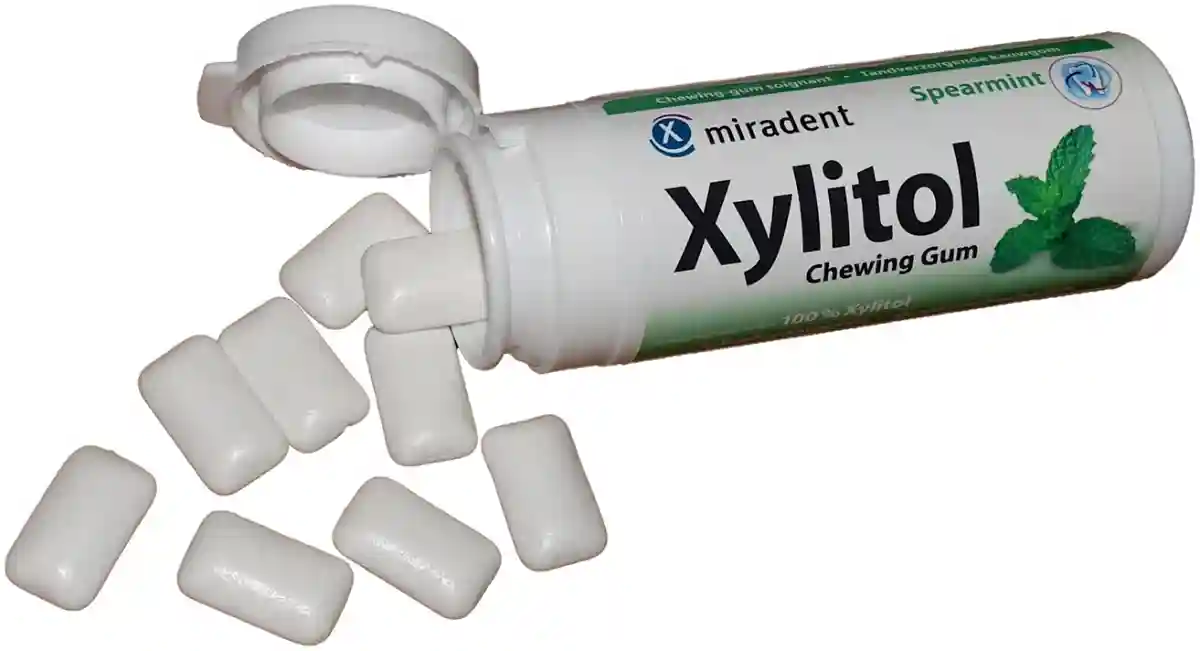Celiac.com 02/17/2024 - In the quest for healthier alternatives to sugar, artificial sweeteners have become a ubiquitous presence in our food and beverages. Marketed as low-calorie or sugar-free options, these sweeteners promise to satisfy our cravings without the guilt. However, for individuals with celiac disease, navigating the world of artificial sweeteners can be fraught with challenges. While these sugar substitutes may seem like a boon for those following a gluten-free diet, they can often trigger gastrointestinal issues and exacerbate symptoms associated with celiac disease. In this article, we'll delve into the hidden complexities of artificial sweeteners and explore their impact on digestive health, shedding light on why individuals with celiac disease should approach them with caution.
While sugar alcohols are generally considered gluten-free, it's essential to verify the gluten status of any product you consume, as some products may contain trace amounts of gluten due to manufacturing processes or cross-contamination. Fortunately, many manufacturers produce gluten-free versions of products that contain artificial sweeteners, clearly labeling them as such for consumers' convenience. Individuals with celiac disease or gluten sensitivity should carefully read ingredient labels and choose products that are naturally gluten-free and don't have wheat listed as an allergen, or products that have been certified gluten-free by reputable organizations to minimize the risk of gluten exposure. By staying informed and vigilant, individuals can enjoy artificial sweeteners as part of a gluten-free diet without compromising their digestive health, but it's important to understand that some can cause gastrointestinal discomfort.
Advantame
Celiac.com Sponsor (A12):
Advantame, a high-intensity artificial sweetener approved by the FDA in 2014, is chemically similar to aspartame but is much sweeter. While advantame is considered safe for consumption by regulatory agencies, its potential impact on digestive health in individuals with celiac disease is not well understood. Some individuals with celiac disease report experiencing gastrointestinal symptoms such as bloating, gas, and diarrhea after consuming products containing advantame. However, more research is needed to elucidate the specific effects of advantame on digestive health in individuals with celiac disease and gluten sensitivity.
Acesulfame Potassium (Ace-K)
Acesulfame potassium, often referred to as Ace-K, is a calorie-free artificial sweetener commonly used in a variety of sugar-free and low-calorie products. While Ace-K is generally recognized as safe for consumption by regulatory agencies, its potential impact on digestive health, particularly in individuals with celiac disease, is not well understood. Some individuals with celiac disease report experiencing gastrointestinal symptoms such as bloating, gas, and diarrhea after consuming products containing Ace-K. However, further research is needed to determine the specific effects of Ace-K on digestive health in individuals with celiac disease and gluten sensitivity.
Aspartame
Aspartame, a popular artificial sweetener found in diet sodas, sugar-free gum, and various other products, has been a subject of controversy regarding its potential effects on gastrointestinal health. While the FDA and other regulatory bodies have deemed aspartame safe for consumption, some individuals with celiac disease report experiencing digestive discomfort after consuming products containing this sweetener. Although research on the specific impact of aspartame on celiac disease is limited, anecdotal evidence suggests that it may exacerbate symptoms such as bloating, gas, and diarrhea in susceptible individuals. Therefore, those with celiac disease may choose to exercise caution and limit their intake of products containing aspartame to avoid potential digestive disturbances.
Cyclamate
Cyclamate, another artificial sweetener, was banned in the United States in 1969 due to concerns about its potential carcinogenicity. While cyclamate is no longer used as a sweetener in the US, it is still permitted in many other countries and is found in a variety of food and beverage products worldwide. Some individuals with celiac disease report experiencing gastrointestinal symptoms after consuming products containing cyclamate, although scientific evidence linking cyclamate to digestive issues in celiac disease is limited. Nonetheless, individuals with celiac disease may choose to avoid products containing cyclamate to minimize the risk of potential discomfort.
Erythritol
Erythritol is a sugar alcohol commonly found in fruits and fermented foods. It's known for its sweet taste, similar to sugar, but with fewer calories and a lower glycemic index. While erythritol is generally well-tolerated, consuming large amounts may lead to gastrointestinal issues such as bloating, gas, and diarrhea, especially in individuals with digestive sensitivities like celiac disease.
Hydrogenated Starch Hydrolysates (HSH)
HSH is a group of sugar alcohols produced by hydrogenating corn syrup. They are commonly used as sweeteners in sugar-free candies and chewing gum. Like other sugar alcohols, HSH may cause gastrointestinal issues such as bloating and diarrhea, particularly in individuals with digestive sensitivities like celiac disease. Monitoring HSH intake can help minimize digestive discomfort in susceptible individuals.
Isomalt
Isomalt is a sugar alcohol derived from sugar beets and commonly used as a sweetener in sugar-free candies and diabetic-friendly foods. While it's low in calories, excessive consumption of isomalt can cause gastrointestinal symptoms like bloating and diarrhea. People with celiac disease may experience heightened sensitivity to isomalt, necessitating moderation in its consumption.
Lactitol
Derived from lactose, lactitol is used as a sugar substitute in sugar-free products and as a laxative. While it's generally well-tolerated, some individuals may experience gastrointestinal side effects such as bloating and diarrhea after consuming lactitol. Individuals with celiac disease should monitor their lactitol intake to avoid exacerbating digestive discomfort.
Maltitol
Maltitol is a sugar alcohol with about half the calories of sugar. It's commonly used as a sweetener in sugar-free candies and baked goods. Like other sugar alcohols, maltitol may cause gastrointestinal issues such as bloating and diarrhea, particularly in sensitive individuals. People with celiac disease should be cautious when consuming maltitol-containing products to avoid exacerbating digestive symptoms.
Mannitol
Found naturally in seaweed and mushrooms, mannitol is used as a sweetener in sugar-free products and as a coating for medications. While it's generally considered safe, consuming large amounts of mannitol may lead to gastrointestinal discomfort, including bloating and diarrhea. Individuals with celiac disease should be mindful of mannitol intake to prevent digestive issues.
Neotame
Neotame, a relatively newer artificial sweetener approved by the FDA in 2002, is chemically similar to aspartame but is significantly sweeter. While neotame is considered safe for consumption by regulatory agencies, its potential impact on digestive health, particularly in individuals with celiac disease, remains a topic of interest and debate. Some individuals with celiac disease report experiencing gastrointestinal symptoms such as bloating, gas, and diarrhea after consuming products containing neotame. However, more research is needed to determine the specific effects of neotame on digestive health in individuals with celiac disease and gluten sensitivity.
Saccharin
Saccharin, the oldest artificial sweetener on the market, has been used in various foods and beverages for over a century. Despite its long history of use, saccharin remains a subject of debate regarding its potential impact on digestive health. While saccharin itself is gluten-free and generally recognized as safe for consumption, some individuals with celiac disease report experiencing gastrointestinal symptoms after consuming products containing this sweetener. Although scientific evidence linking saccharin to digestive issues in celiac disease is limited, individuals with gluten sensitivity may choose to exercise caution and limit their intake of saccharin-containing products to avoid potential discomfort.
Sorbitol
Sorbitol is another sugar alcohol naturally present in fruits and vegetables. It's frequently used as a sweetener in sugar-free candies and gums. Like erythritol, sorbitol can cause gastrointestinal discomfort, including bloating and diarrhea, particularly when consumed in excess. Individuals with celiac disease may be more susceptible to these effects due to underlying digestive issues.
Stevia
Stevia, a natural sweetener derived from the leaves of the Stevia rebaudiana plant, has gained popularity as a healthier alternative to sugar and artificial sweeteners. While stevia is generally considered safe for consumption and is naturally gluten-free, some individuals with celiac disease may still experience gastrointestinal symptoms after consuming products containing stevia. Although rare, allergic reactions to stevia have been reported, which may manifest as digestive discomfort in susceptible individuals. Therefore, individuals with celiac disease should be mindful of their intake of stevia-containing products and monitor their digestive response accordingly.
Sucralose
Sucralose, marketed under the brand name Splenda, is another widely used artificial sweetener found in a variety of sugar-free and low-calorie products. While sucralose itself is considered gluten-free and safe for most people, individuals with celiac disease may still experience gastrointestinal issues when consuming foods or beverages containing this sweetener. Some studies suggest that sucralose may alter gut microbiota composition and disrupt the balance of beneficial bacteria in the digestive system, potentially leading to digestive discomfort. Therefore, individuals with celiac disease should be mindful of their intake of sucralose-containing products and monitor their digestive response accordingly.
Xylitol
Derived from various fruits and vegetables, xylitol is a popular sugar substitute found in chewing gum, candies, and oral care products. While it's considered safe for most people, some individuals may experience gastrointestinal symptoms like bloating and diarrhea after consuming xylitol-containing products. For those with celiac disease, monitoring xylitol intake can help mitigate potential digestive discomfort.
Conclusion
While sugar alcohols offer a tempting alternative to traditional sugar for those with celiac disease or gluten sensitivity, it's crucial to approach them with caution to prevent exacerbation of digestive symptoms. While they can be a useful tool for managing blood sugar levels and reducing calorie intake, their potential to cause gastrointestinal discomfort cannot be overlooked. Individuals should be mindful of their tolerance levels and consumption patterns, opting for products labeled gluten-free and certified by reputable organizations whenever possible. By making informed choices and listening to their bodies, individuals can strike a balance between enjoying the benefits of artificial sweeteners and maintaining their digestive well-being on a gluten-free diet.










Recommended Comments
Create an account or sign in to comment
You need to be a member in order to leave a comment
Create an account
Sign up for a new account in our community. It's easy!
Register a new accountSign in
Already have an account? Sign in here.
Sign In Now